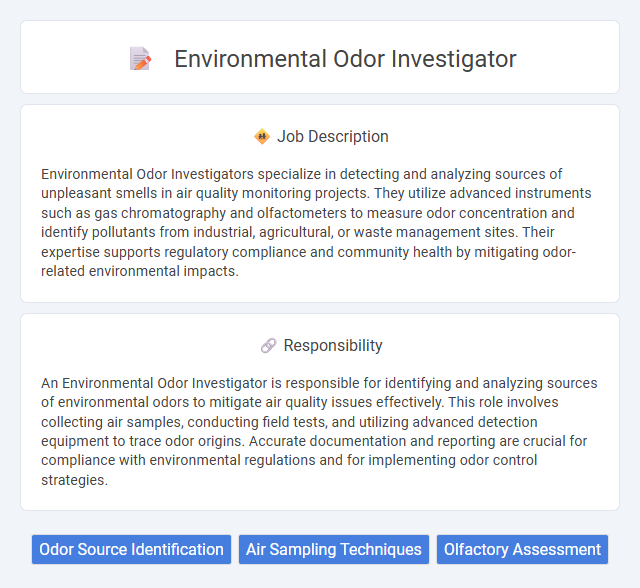
Environmental Odor Investigators specialize in detecting and analyzing sources of unpleasant smells in air quality monitoring projects. They utilize advanced instruments such as gas chromatography and olfactometers to measure odor concentration and identify pollutants from industrial, agricultural, or waste management sites. Their expertise supports regulatory compliance and community health by mitigating odor-related environmental impacts.
Individuals with a strong tolerance for exposure to various odors and environments might find the Environmental Odor Investigator role suitable. Those prone to respiratory issues or sensitivities to strong smells may face challenges adapting to the job's demands. Awareness of potential health impacts and a robust physical condition could increase the probability of job success in this field.
Qualification
An Environmental Odor Investigator requires a strong background in environmental science, chemistry, or a related field, often with a bachelor's degree as a minimum qualification. Proficiency in odor sampling techniques, gas chromatography, and sensory analysis tools is essential for effectively identifying and assessing odor sources. Experience in regulatory compliance, environmental monitoring, and data interpretation enhances the ability to manage odor complaints and support mitigation strategies.
Responsibility
An Environmental Odor Investigator is responsible for identifying and analyzing sources of environmental odors to mitigate air quality issues effectively. This role involves collecting air samples, conducting field tests, and utilizing advanced detection equipment to trace odor origins. Accurate documentation and reporting are crucial for compliance with environmental regulations and for implementing odor control strategies.
Benefit
Environmental Odor Investigator positions may offer the benefit of contributing to community health by identifying and mitigating odor pollution sources. This role likely provides opportunities for hands-on fieldwork combined with analytical problem-solving, which could enhance professional expertise in environmental science. Individuals in this job might also experience job satisfaction from supporting regulatory compliance and improving quality of life for affected populations.
Challenge
Environmental Odor Investigator roles likely involve the challenge of accurately identifying and tracing sources of complex and intermittent odors in diverse environments. They may need to use advanced detection equipment and analytical skills under variable weather conditions, which could complicate odor sampling and assessment. Managing the expectations of affected communities and regulatory agencies might also present ongoing difficulties.
Career Advancement
Environmental Odor Investigators play a crucial role in identifying and mitigating odor pollution, often working with regulatory agencies and industries to ensure compliance with environmental standards. Career advancement in this field typically involves gaining expertise in air quality modeling, chemical analysis, and environmental regulations, leading to roles such as senior investigator, environmental consultant, or compliance manager. Professionals with advanced certifications and experience in environmental science or engineering can progress to leadership positions, influencing policy development and sustainability initiatives.
Key Terms
Odor Source Identification
Environmental Odor Investigators specialize in identifying and analyzing odor sources to mitigate environmental impact and improve air quality. They employ advanced techniques such as air sampling, chemical analysis, and odor modeling to pinpoint odor origins in industrial, agricultural, and urban settings. Their expertise supports regulatory compliance and community odor complaint resolution, enhancing environmental health and public satisfaction.
Air Sampling Techniques
Environmental Odor Investigators specialize in air sampling techniques to detect and analyze odor pollutants from various sources, ensuring compliance with environmental regulations. They employ advanced methods such as dynamic olfactometry and gas chromatography to identify volatile organic compounds (VOCs) responsible for odors. Proper calibration of air sampling equipment and strategic placement of sensors are critical for accurate data collection and effective odor management.
Olfactory Assessment
Environmental Odor Investigators specialize in olfactory assessment to identify and analyze sources of odors affecting air quality in residential and industrial areas. They utilize sensory evaluation techniques, including field odor panels and dynamic olfactometry, to measure odor concentration, character, and intensity. Their work supports regulatory compliance and community odor management strategies by providing accurate, science-based odor impact data.
 kuljobs.com
kuljobs.com